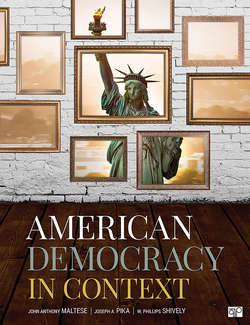Читать книгу American Democracy in Context - Joseph A. Pika - Страница 124
На сайте Литреса книга снята с продажи.
Consequences for Democracy
ОглавлениеMost people do not initially think that federalism will be the most engaging topic they will cover when studying American government. They may even think of it as boring, but first impressions can be deceiving. After all, federalism was one of the most contentious issues, if not the most contentious issue, from the Constitutional Convention through most of the 1800s. Debates about national supremacy versus states’ rights permeated the Constitutional Convention, influenced the development of our political parties, led to the Civil War, and shaped subsequent civil rights policies.
Those debates have never gone away. They were at the forefront of whether Congress, during the Progressive Era of the 1890s to the 1920s, could pass legislation protecting employees in the workplace through laws regulating things such as minimum wages, child labor, and maximum hours. Embracing dual federalism, the Supreme Court mostly said no.
As the United States struggled to emerge from the depths of the Great Depression in the 1930s, the debate turned to whether the New Deal legislation implemented by President Franklin Roosevelt and his fellow Democrats in Congress was constitutional. Until 1936, the answer was, again, mostly no. That changed with the “switch in time” in 1937. That switch not only meant that New Deal legislation designed to regulate the economy was upheld but also that workplace regulations that had been routinely struck down for decades were now deemed constitutional.
Today, many of the most controversial aspects of federalism deal with social issues such as same-sex marriage, gun control, health care reform, education, immigration, and the legalization of marijuana. Far from being uninteresting, we believe that federalism—throughout our history—has involved some of the most fascinating and relevant issues one can imagine. Certainly, these policies relate to you on a daily basis: what you studied in high school, who you can marry, at what age you can drink alcohol, how fast you can drive, whether or not there is a minimum wage, and whether you can be discriminated against in a hotel because of your race, to name only a few. Just as profoundly, federalism will shape your future. After all, things such as Social Security and Medicare would not have been possible without the “switch in time.” Think about that the next time someone says that federalism is boring or unimportant. In fact, few aspects of our governmental system have a greater impact on your daily life.
